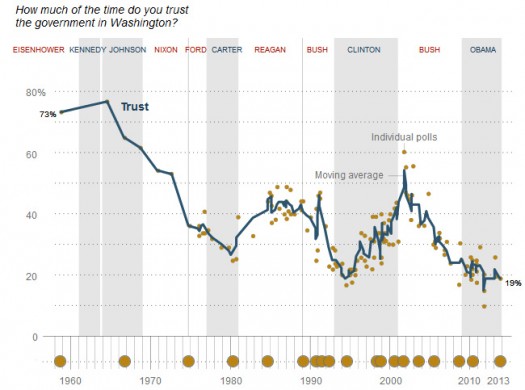A Placemaking Journal
Reaching the Limits of Passionate Defense: Time to turn back
When House Speaker John Boehner, indulging his inner Howard Beale, launched a Republican counterattack against the party’s far right wing, it seemed to me the GOP was finally rubbing up against the same rough edges of reality that have become apparent in big-time sports. And the lessons apply as much to civic life in towns and regions as to Washington politics.
Here’s what the life lab of sports tells us: Stressing defensive disruption over offensive accountability is a losing proposition.
For those who make the rules in sports, it took a while to get to this point, what with the entertainment value of violent chaos — the flying bodies in football, the crush against the boards in hockey, the leeway allowed for harassing dribblers in basketball. Though mounting player injuries were factors in some cases, what changed the minds of coaches and league officials had a lot to do with the coming of age of “Moneyball” statistical analyses of what really counts when it comes to winning games.
Stats are to sports as calorie counts are to weightwatchers, so first baseball, then all the other popular games fell under the thrall of quantitative analysis. I was particularly happy to see the “defense wins championships” cliché bite the dust in football, since it was such an irrational assertion to begin with. But before we get to that, let’s admit how tough it is to extract coherent metaphors for life out of sports competition. Which is not to say a lot of us — including me — haven’t been determined to do just that. Here’s the challenge:
In the attempt to reduce the difference between winning and losing to the abilities of competitors to prepare and adapt under tightly controlled circumstances, sports try to cut most of the complicating variables of life out of the process. The physical boundaries of play, the time or scoring opportunities allotted, the size of squads and rules to assure fair play are strictly proscribed. Officials referee the action in real time. In professional contests there are even complex systems for allotting talent (player drafts with the previous season’s losers getting first crack at the best available players, salary caps, etc.). All of which suggests the defining characteristics of sports competition differ in most ways from the far more open-ended, un-refereed games we play in business, politics and other aspect of our life. We are nevertheless drawn to the simplest defining principles of competition: Winning by scoring more points than the other guy.
The distinction between offensive and defensive strategies is the distinction between purposes related to scoring. When you’re trying to impose a point-scoring strategy on the opposition, you’re playing offense; when you’re trying to stop the other guys from scoring, you’re on defense. By that logic, the best a perfectly executed defensive strategy can do without help from a points-scoring offense is a no-win, no-lose outcome — a tie.
On fields of play in sports, offensive and defensive roles change according to game situations. Transitions can be instantaneous, with the same players — especially in hockey, basketball and soccer — quickly making the switch back and forth between offensive and defensive responsibilities. Even in football, which recruits and trains talent for primarily offensive or defensive roles, winning sometimes depends on adapting to the role transition instantly. In the November 30 Alabama-Auburn college football game, Alabama, arguably, lost its chance to compete for a third consecutive collegiate football championship because of the failure to make the transition from breaking a tie with a last-second offensive play, a field goal, to preserving the tie by stopping Auburn from scoring via a 109-yard return of the failed kick.
Understanding the importance of such transitions, of adapting to sudden changes in the requirements for achieving success, might help us do a better job applying the real lessons of sports to competition off the field or court. But it’s a lot easier to show a picture of a football safety crushing a wide receiver in the Super Bowl and declare defense the difference-making strategy for championship play.
Thankfully, the football quants have undercut the dominant defense myth with an exhaustive analysis of correlations between defensive performance and championship play. Here is Stephen J. Dubner, of NFL Stats, with a summary of the analysis: “Let’s not kid ourselves. No matter how great your offense is, of course you want a great defense to go along with it. But the idea that a great defense is some kind of magic bullet — able to transcend gravity, logic, and time — should probably be stuck away in a drawer.”
Hockey, that most contact-oriented of major sports, is not escaping the quants’ analyses either. Stats show limited correlations between hits and scoring and even turnovers and scoring. It’s all about controlling the puck. Here (http://es.pn/1dA9APi) is Peter Keating in the most recent ESPN magazine:
“It’s surprising but makes a certain logical sense. If you’re frequently delivering crunching hits, blocking shots or grabbing takeaways, it means the other guys had the puck to begin with. And if you’re thwarting a lot of scoring chances, you’re probably allowing a lot of scoring chances.”
We may finally have a really useful metaphor drawn from sports: To win, you have to score. “To score, you need to shoot,” says Keating. “And to shoot, you need the puck.”
Okay, now let’s get back to the House Republicans’ sudden reversal in their exclusively defensive strategy and to the implications for winning in meaningful ways in our neighborhoods, communities and regions. What Boehner, Paul Ryan and other prominent GOP leaders apparently understood is that they were losing control of the puck. The take-no-prisoners defensive strategies in Washington have contributed to Americans’ growing distrust of government. And the threat was increasing that in 2014 and 2016 elections, voters might hold incumbents accountable.
The budget compromise the Democrats and Republicans reached made neither side deliriously happy. To resign her party members to the deal, House Minority Leader Nancy Pelosi invoked the quasi-Zen phrase borrowed from combat veterans: “Embrace the suck.” (Slate explores the phrase’s history here, and you can get your “Embrace the suck” T-shirts and coffee cups here.) The agreement seems an optimistic step only in the context of the policy defensive tactics of the recent past, including shutting down the government and threatening debt default without a repeal of Obamacare.
Lest we get too puffed up over the excesses of the right, let’s remember that similar defensive rhetoric, if not the fully implemented strategies of obstruction, have also come from the left, especially the old left. When I hear the passionate appeals for personal freedom from the right, questioning that a consensus could ever be achieved over what constitutes a common good worthy of sacrificing any of those freedoms, I remember the “do your own thing” confidence of the 1960s. The declining trust in government seems a fulfillment of the admonition on lefty bumper stickers to “question authority.” And I remember, from 1964, Mario Savio inspiring not only the Berkeley Free Speech Movement, but a generation of student protest:
“There’s a time when the operation of the machine becomes so odious, makes you so sick at heart, that you can’t take part! You can’t even passively take part! And you’ve got to put your bodies upon the gears and upon the wheels…upon the levers, upon all the apparatus, and you’ve got to make it stop! And you’ve got to indicate to the people who run it, to the people who own it, that unless you’re free, the machine will be prevented from working at all!”
Savio’s passion, captured on a Youtube video here, was in service to a defensive strategy that had to be radical enough to respond to what many saw as a growing threat of a military-industrial complex determined to enslave us all. Re-hearing that speech now, it’s not at all hard to imagine something similar in tone and content coming from the most far-right fringes of American politics in a fever over the ambitions of a black Muslim president in league with the United Nations to revoke Americans’ property rights, seize their guns and cars and assign them to urban ghettos for the rest of their lives.
Given such a perceeption, would not a shut down of an Obama-led government be a justifiable defense? Something equivalent to putting “your bodies upon the gears and upon the wheels” of the apparatus of that government in the name of freedom?
On the community level, the range of threats to freedom and property rights that provoke NIMBY defensive strategies has expanded as the aggrieved constituencies have shrunk. Where once the fights were about threats to health and safety on a community-wide basis, now many of the fiercest duke-outs are over the perceived impact on a neighborhood if more cars were allowed in their vicinity or if homes of lesser appraised value were constructed nearby.
I think even the late Mario Savio would agree that we’ve significantly lowered the bar for implementing defensive strategies that gum up the gears of civic life.
I’m for adapting a rare good example from sports of recalibrating our enthusiasm for a vigorous defense, especially if it distracts us from holding ourselves accountable for achieving quantifiable results. And I’m for that, even if it means adapting an even rarer good example from Congress for achieving outcomes that require embracing the suck.
–Ben Brown
If PlaceShakers is our soapbox, our Facebook page is where we step down, grab a drink and enjoy a little conversation. Looking for a heads-up on the latest community-building news and perspective from around the web? Click through and “Like” us and we’ll keep you in the loop.








